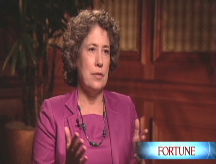Should you jump in now?
Investor Daily: Ignore, for a minute, the turmoil in the business world. If you have the time (say, six years) and patience, you may want to carefully consider the markets.
(Fortune Magazine) -- Has there ever been a time that feels worse than now to talk about houses and stocks? Not in my 40 years of writing about business. The sickening collapses in house and stock prices from their peaks have trimmed about $13 trillion - almost a year's output for the entire U.S. economy - from Americans' net worth.
Not since the Great Depression almost 80 years ago have we seen anything like these simultaneous housing and stock implosions, and back then houses and stocks were owned by only a relative handful of Americans, whereas in today's world, two-thirds of us own houses and half of us own stocks.
It's really scary out there. The S&P Case-Shiller index, which measures housing prices in 20 big markets, continues to fall. Foreclosures mount; dire predictions fill the air. The stock market lurches up and down like a roller coaster on steroids, and seems to fall - or occasionally rise - by 5% or more every other trading day.
Each weekend now, you expect to hear that yet another big financial institution has to be closed down or bailed out by federal regulators. Lots of us who've invested for years (including me) have had a big part of our net worth wiped out almost overnight. It makes you feel like crawling into a cellar, closing the door, and not coming out until the all-clear signal sounds.
But even though housing and stocks may be the last things you feel like talking about, they're things that you should talk about. That's because for the first time in years (or maybe decades) prices of homes and U.S. stocks have fallen low enough to be considered reasonable long-term investments again.
No, I'm not suggesting that you run out and binge-buy houses and stocks. Even though they've fallen about 25% and 45%, respectively, from their peaks, houses and stocks could well fall further, possibly much further.
That's what happens when bubbles deflate - things can fall into a reasonable-value zone, then keep on falling until they're unreasonably low. It's the other side of an inflating bubble, during which prices can keep rising even after they're unreasonably high.
But if you're prudent - I'll define that a bit later - and if you're willing and able to commit your money for at least six years, I think you'll wake up in 2015 or 2016 and see that you've done okay. You won't make the nearly 20% a year that U.S. stocks generated during the 1982-2000 bull market, or the even bigger gains homeowners and flippers made on their investments early in this century, when the housing bubble inflated. But you're more than likely to make some reasonable money, much more than you'll make hiding out in Treasury securities or money market mutual funds.
Before you rush to write checks, however, please remember that you shouldn't put money into stocks or houses or other investments unless you can do it while adhering to the three eternal verities of financial survival. They are: Live within your means or below them; shun credit card debt like the plague it is and don't borrow except for an education, a home, or a car; and use your house as a place to live, not as a cash machine or a get-rich-quick scheme.
In addition, don't start investing until you've accumulated an adequate reserve fund. To me, that means enough to cover your bills for at least three months if you (and any other employed people in your household) lose your job (or jobs).
The only exception would be to invest modestly in a 401(k) or similar retirement program to take advantage of your employer's matching contributions.
Now to our discussion. Let's start with stocks, which are easier to analyze and invest in than houses are. Stocks are selling at about the same prices as ten years ago, which means the U.S. market as a whole has been dead money for a decade.
But that may be changing. In fact, some of the smartest long-term investors in the country, who had largely shunned stocks for years, now say that stocks have moved into a reasonable zone.
Bob Rodriguez of FPA Capital (FPPTX) told a Fortune roundtable that the number of stocks that pass his value screen has risen to 447 (out of 10,000), up from only 33 in June 2007. Jeremy Grantham of GMO, another roundtable participant, considers stocks to be reasonably priced for the first time in years. Stocks have reached reasonable levels even by the tough standards of Yale professor Robert Shiller, famous for calling both the stock and house bubbles.
-
 The retail giant tops the Fortune 500 for the second year in a row. Who else made the list? More
The retail giant tops the Fortune 500 for the second year in a row. Who else made the list? More -
 This group of companies is all about social networking to connect with their customers. More
This group of companies is all about social networking to connect with their customers. More -
 The fight over the cholesterol medication is keeping a generic version from hitting the market. More
The fight over the cholesterol medication is keeping a generic version from hitting the market. More -
 Bin Laden may be dead, but the terrorist group he led doesn't need his money. More
Bin Laden may be dead, but the terrorist group he led doesn't need his money. More -
 U.S. real estate might be a mess, but in other parts of the world, home prices are jumping. More
U.S. real estate might be a mess, but in other parts of the world, home prices are jumping. More -
 Libya's output is a fraction of global production, but it's crucial to the nation's economy. More
Libya's output is a fraction of global production, but it's crucial to the nation's economy. More -
 Once rates start to rise, things could get ugly fast for our neighbors to the north. More
Once rates start to rise, things could get ugly fast for our neighbors to the north. More















